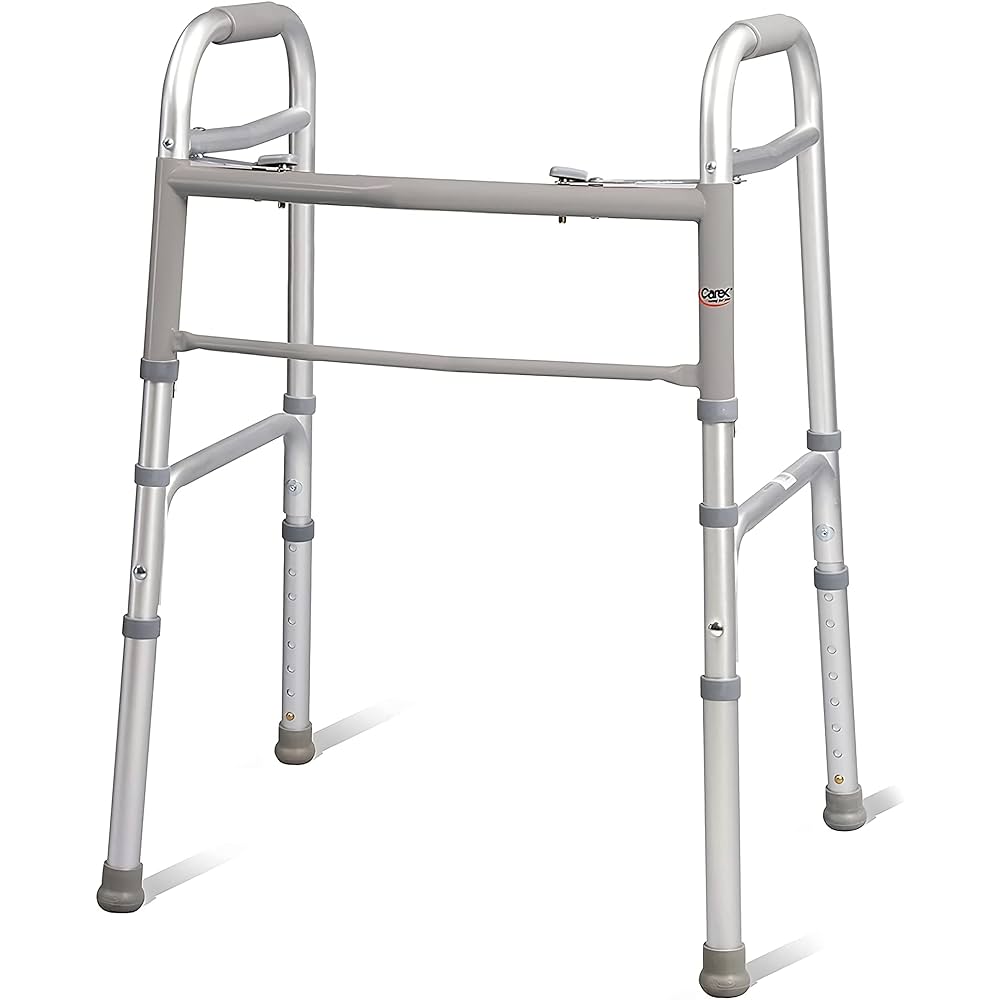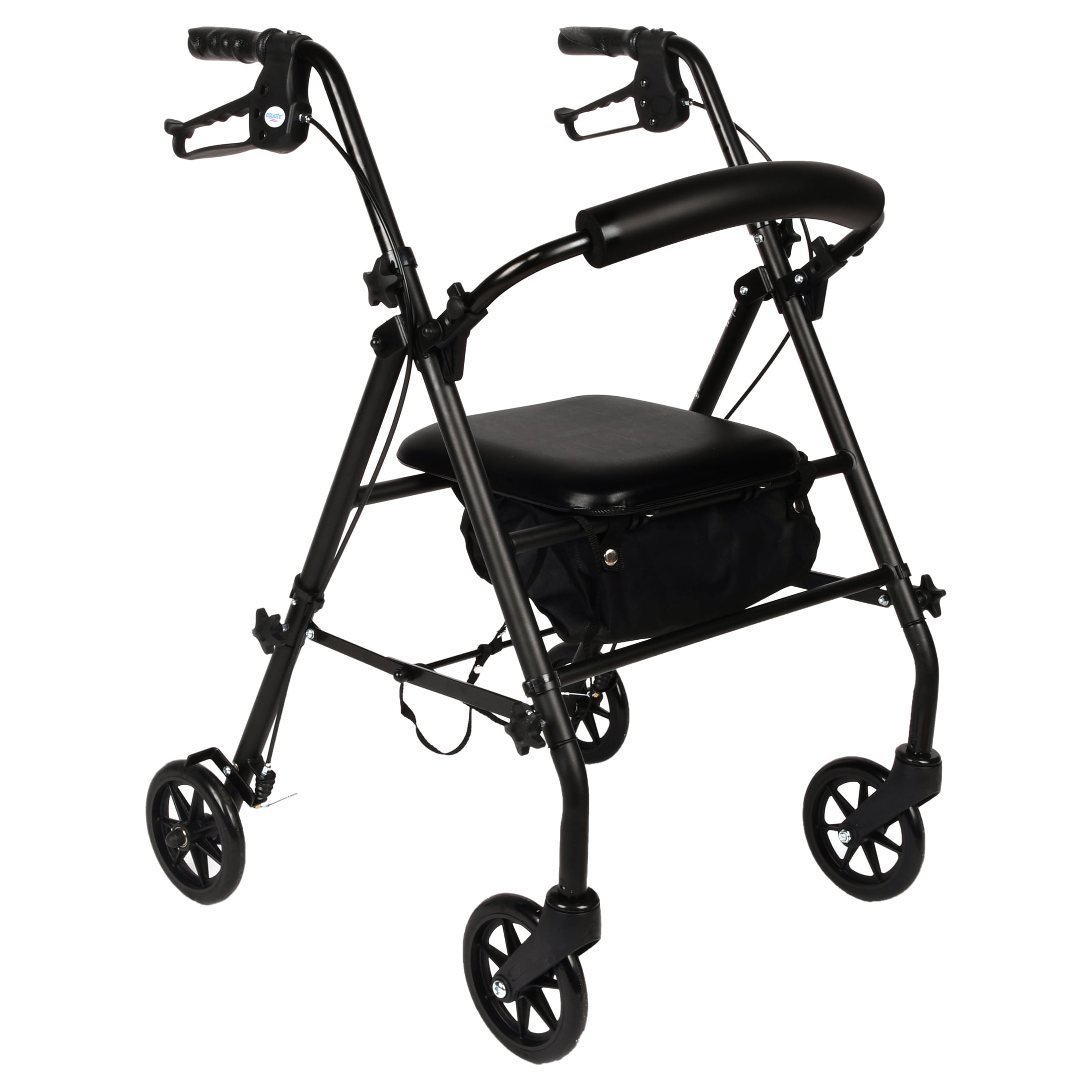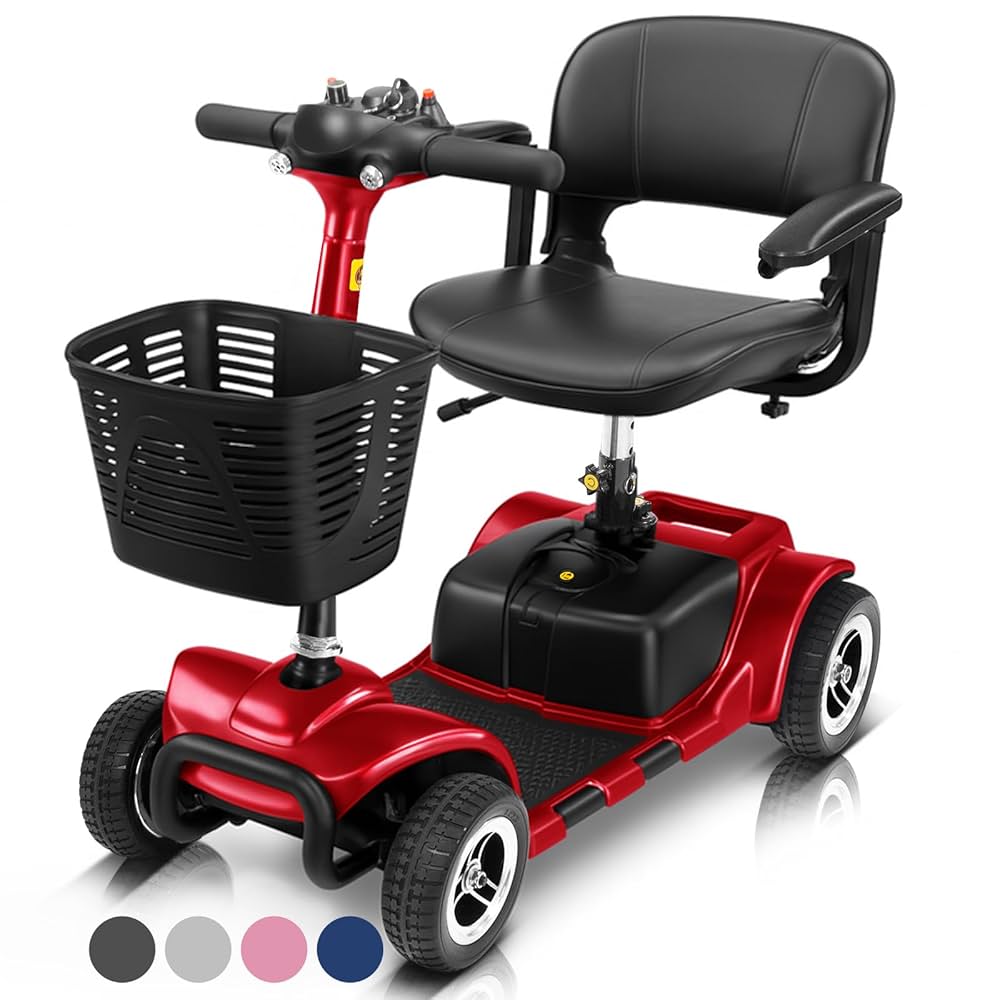-
Talk to Our Care Planner
The Best Walking Aids for Elderly People
If you’re caring for an older parent or grandparent, you know how much their independence means to them.
Something as simple as walking across the room or down the street can feel daunting if balance isn’t what it used to be. That’s where walking aids come in.
They’re regular “medical devices” but they’re in fact lifelines that help seniors stay active, safe, and confident.
Let’s explore the main types of walking aids, starting with the most basic and moving toward more supportive options.
Along the way, I’ll point out the top-rated products available in the U.S. right now, and share why they might be a good fit for your loved one.
CONTENT:
Canes: A Small Tool with a Big Impact

Canes are the simplest kind of walking aids for elderly people.
They’re great for seniors who just need a little extra help with balance or want to take pressure off a painful leg. They’re light, adjustable in height, and easy to carry around.
The right supportive shoes can also steady each step on tile and hardwood.
Think of them as the first “step up” before moving to something sturdier like a walker. But not all canes are created equal; there are single-point canes, offset-handle canes (better weight distribution), and quad canes with a four-footed base for more stability.
Simple seated core work helps posture and control, which makes a cane feel more secure.
Nova Heavy Duty Offset Cane
This cane is made from sturdy aluminum but weighs just about 2 pounds. It can hold up to 500 pounds, which makes it a reliable option for heavier users.
The foam grip is soft in the hand, and the wrist strap keeps it from dropping when your loved one is out and about. The handle adjusts for people from about 4’11” to 6’4” so whether your elderly loved one is petite or tall, it works.
Pros: Very strong, lightweight, and easy to adjust.
Cons: Doesn’t fold, so not the easiest to travel with.
HurryCane Freedom Edition (Folding Cane)
This cane has become something of a household name because it’s designed to stand on its own. Its three-pronged base pivots with each step, mimicking natural foot motion.
It folds down small enough to fit in a bag or the car, which makes it handy for errands or travel.
Pros: Light, portable, with good traction.
Cons: Uses special replacement tips that aren’t always easy to find.
Hugo Mobility QuadPod Cane
This cane has a clever four-point tip that’s lighter and less bulky than most quad canes. It even re-centers itself after each step, so it stays stable.
With 12 height settings, it can fit almost anyone, and the cushioned handle feels gentle on the wrist.
Pros: Extra stability, stands on its own, comfortable handle.
Cons: A little heavier than a single-tip cane and less practical on stairs.
If your loved one just needs “a little something” for confidence, a cane could be the right match. But if walking feels wobbly or tiring, the next step up might be better.
A little leg strength work can reduce knee and hip strain so short walks feel safer.”
Walkers: For Maximum Stability

Walkers give seniors a strong, wide base of support.
These are the best walking aids for elderly people who feel very unsteady or who are recovering from surgery. Early home PT support teaches safe walker use and short, steady progress
A walker requires both hands, but the trade-off is much more stability than a cane.
Some walkers have no wheels (they need to be lifted with each step), while others add two wheels in front so the user can push instead of lift.
Walkers usually fold flat, so you can slide them behind the couch or into a car trunk.
Drive Medical Deluxe Folding Walker (Two-Button, with Wheels)
This is a lightweight walker (around 7.5 pounds) made from aluminum tubing. It holds up to 350 pounds. With two front wheels and glide caps in the back, it moves smoothly across floors and carpets.
Each side folds independently with the press of a button—very convenient when moving through narrow spaces.
Pros: Light, stable, and easy to fold.
Cons: Wheels don’t swivel, so turning requires a little more space.

Medline Heavy-Duty Bariatric Walker
For larger seniors, this walker is a lifesaver. It’s extra-wide, extra-strong, and supports up to 500 pounds.
Many models include wheels on the front legs to make it easier to push. The padded grips and adjustable height make it comfortable, even for taller users (up to about 42 inches handle height).
Pros: Maximum support, strong and durable.
Cons: Heavier and bulkier than standard walkers—can be tricky in tight doorways.
If your loved one tends to lose balance easily or is nervous about falling, a walker can restore confidence. It may be slower than a rollator, but sometimes slow and steady really is the best way to go.
A simple daily routine with two or three short walks helps confidence grow
Rollators: Mobility with Comfort
Rollators are like walkers, but with four wheels, hand brakes, and usually a padded seat. They’re wonderful for seniors who want to move more quickly and independently but still need the reassurance of a stable aid.
Unlike walkers, they roll smoothly, and when your loved one gets tired, they can sit right down on the built-in seat.
These are especially useful for shopping trips, strolls in the park, or just moving around the neighborhood.
The brakes give a sense of safety, and most rollators come with storage baskets or bags—perfect for groceries or personal items.
A short caregiver checklist keeps meds, water, and a phone in the bag before you head out
Drive Medical Nitro Euro-Style Rollator
This is one of the most popular rollators out there. It looks modern and sleek, with brake cables hidden inside the frame so nothing snags.
Its large 10-inch front wheels handle sidewalks and indoor floors equally well. It folds side-to-side with just one hand, which is great for caregivers loading it into a car.
Pros: Very stable, smooth to roll, and stylish.
Cons: The seat height is fixed, and the storage pouch isn’t the most secure.

Medline Empower Rolling Walker
This rollator is packed with thoughtful features. It has adjustable height, adjustable seat depth, and even a flip-up padded seat that lets users step inside the frame to reach a counter.
There’s a storage bag, cup holder, and even a cane holder built in. It folds easily and stays closed with a latch.
Pros: Very comfortable, customizable, and caregiver-friendly.
Cons: A little heavier and not as nimble in small spaces.
Drive Go-Lite Bariatric Rollator
Built tough, this rollator supports up to 500 pounds. It has a wide padded seat, strong steel frame, and 8-inch wheels that handle a variety of surfaces.
The only downside is that it weighs about 26 pounds, making it harder to lift.
Pros: Heavy-duty, supportive, and comfortable.
Cons: Bulky and less portable than lighter rollators.
Rollators are wonderful for seniors who want to get out and about but like having a “built-in seat” when their legs get tired. They give both freedom and peace of mind.
For memory loss, dementia-friendly outings help walks feel calm and predictable.
Powered Mobility Options
Powered mobility aids are essentially small vehicles designed for seniors when walking is not possible. They’re battery-operated, comfortable, and surprisingly easy to use.

There are two main types:
- Mobility scooters – steered with handlebars (like a bike), usually with a small basket for shopping.
- Power wheelchairs – controlled by a joystick, with a very tight turning radius for indoor use.
On tired days, short bed exercises keep joints moving without leaving the mattress.
Let’s look at some of the most trusted models in the U.S. right now.
Pride Go-Go Ultra X (Travel Mobility Scooter)
This scooter is all about convenience. It drives at around 4 mph, which is a comfortable walking pace, and can go up to 8–9 miles on a single charge.
The best part? It breaks down into five lightweight pieces so you can load it into a car without straining your back.
It has a cushioned seat with flip-up armrests, a front basket, and easy wrist-friendly controls. It’s sturdy enough to support up to 300 pounds but still compact enough to use indoors, like in a grocery store aisle.
Pros: Simple to assemble, easy to drive, perfect for errands.
Cons: Works best only on smooth ground; not ideal for steep hills or rough terrain.
Pride Jazzy Select Power Chair
If your loved one struggles even with a scooter’s handlebars, a power chair might be the answer.
The Jazzy Select uses a joystick, so it moves wherever the user points—forward, backward, sideways, even turning in place. It’s one of the easiest chairs to maneuver inside a home.
It has six wheels on the ground for stability, plus a suspension system that smooths out little bumps.
The cushioned captain’s seat is adjustable, and the chair can travel up to 19 miles per charge. It’s designed for safety and comfort, whether inside or outdoors on a paved path.
Pros: Excellent for tight spaces, comfortable for long use, very stable.
Cons: Heavy (around 150 lbs), so it requires a lift or van for transport.
Quick Comparison of Walking Aids for Elderly: Which Aid Fits Best?

Here’s a caregiver-friendly snapshot of what we’ve covered so far on walking aids for elderly people:
| Category | Example Product (Capacity) | Key Features | Pros | Cons |
|---|---|---|---|---|
| Cane | Nova Heavy Duty Cane (500 lb) – Offset handle, foam grip;
HurryCane Freedom (350 lb) – Folding, pivoting base. |
• Lightweight aluminum (1–2 lb)
• Adjustable height ~30″–39″ • Specialty bases (quad or pivot) for stability. |
• Portable and easy to use
• Improves balance for mild support • Inexpensive and fits on stairs |
• Limited support (one-point contact)
• Requires good arm strength and balance • Quad bases can be cumbersome |
| Walker | Drive Deluxe Walker (350 lb) – Aluminum, 5″ wheels;
Medline Bariatric (500 lb) – Extra-wide, steel frame. |
• Two-button folding design
• Height adjustable (approx. 32″–39″) • Some models add wheels for easy glide. |
• Maximum stability, supports heavy weight
• Foldable for transport • Helps prevent falls for those with high risk |
• Slower mobility – must be lifted or pushed
• Bulky to maneuver in very tight spaces • No seat; user needs sufficient arm strength |
| Rollator | Drive Nitro Rollator (300 lb) – 4 wheels, seat;
Drive Go-Lite HD (500 lb) – heavy-duty rollator. |
• 4 wheels with hand brakes for control
• Built-in seat and storage pouch/basket • Folds for storage; larger wheels for outdoor use. |
• Faster, smoother mobility than a walker
• User can sit and rest anytime • Hand brakes enhance safety when stopping |
• Heavier than standard walkers (15–25 lb)
• Requires some grip strength to brake • Not ideal for very rough terrain or slopes |
| Powered | Pride Go-Go Ultra X Scooter (300 lb) – 4-wheel travel scooter;
Pride Jazzy Select Chair (300 lb) – power wheelchair. |
• Battery-powered, ~4 mph speed.
• Scooter: Tiller steering, 8–10 mile range. • Power chair: Joystick control, ~19 mile range, tight 22″ turning radius. |
• No walking required – ideal for very limited mobility
• Travel longer distances effortlessly • High weight support and comfort features |
• Bulky and requires charging regularly
• Most expensive category (may need insurance) • Transport can require vehicle lift (for larger models) |
Dr. Ella Njike is the branch administrator for Global One Home Care, Boston, an agency that provides quality care for seniors and kids or adults with disabilities. With a Doctorate and extensive experience working in the healthcare industry, Dr Ella brings a unique understanding to the challenges families face. Through Global One Home Care Boston, he ensures that care extends beyond daily tasks, focuses on building genuine connections and respecting each family's journey.
Contact us
We aim to be an active partner in your care, not to take over. You are the CEO of your care, and we support you in managing it effectively.
Here are some features of our Global One Home Care
- 24/7 access to care
- Customized care plans
- Supervisory visits
- Caregiver introductions
- Nutritional planning
- Respite support
- Companionship
- Mobility assistance
- Durable Medical Equipment recommendations
- Errands and Shopping
- Fall Prevention
- ADLs
